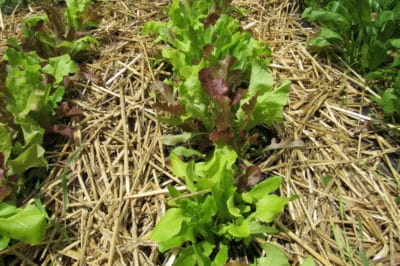Heat Overload
When lettuce goes bitter it’s often called bolting. This can happen after an especially hot day or from too much sunlight. The plant goes into survival mode and decides that it’s probably going to die soon. It seeds in an effort to preserve next year’s offspring. Unfortunately, when lettuce goes to seed, it produces a bitter milky sap that tastes terrible.
Avoid bolting by keeping lettuce plants out of hot midday sunlight. A shade cloth is an excellent way to protect cool season vegetables during the heat of the day. Choose varieties that are bolt resistant or well adapted to your gardening zone and plant them as early as possible. If a whole variety of lettuce bolts in your garden, it’s a good sign that it’s not the best fit. Avoid saving seed from this variety and plant a different one.
Water Deficient
Not enough water can cause lettuce to turn bitter. If the plants appear to be wilting or browning at the edges, it’s a good sign they need a deep watering. Lettuce leaves should be plump and full of moisture. Harvesting lettuce that isn’t hydrated will result in quicker deterioration.
A great way to avoid drying out garden lettuce is to use a drip line. Not only does it conserve water and keep the leaves dry which prevents mold and fungus, it can also be put on a timer for no hassle watering.
Troubleshooting
There are a couple of things you can do if your lettuce is bitter already though it’s easier to prevent than to correct. Here is a list of tips for avoiding bitterness in lettuce:
- Choose heat hardy varieties
- Plant early
- Shade during hot days
- Mulch plants to keep the roots cool
- Keep soil moist
Ultimately there’s nothing harmful about eating lettuce that is slightly bitter. After picking, immediately immerse leaves in cool water. Let them soak for 20 minutes and then dry them off. Store them in a plastic bag in the fridge. The cool temperatures will help reduce bitterness.
